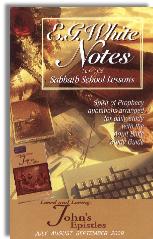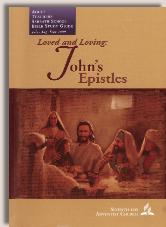|
||||||||||||||
Commentary on "Walking in the Light:
Rejecting Antichrists"
Day 6: Thursday, August 6, 2009
Abiding in Christ is crucial in the Christian life. As with any relationship, communication, concern for the others reputation, and giving gifts to the loved one is important to keep the relationship alive.
Today's lesson does a fine job as far as the student's quarterly lesson is concerned. However, when one turns to the notes in the Teacher's Quarterly, there is a serious problem. At the bottom of Thursday's lesson the question is asked, How do you abide in Christ? The question is a good one. The answer provided in the Teacher's Quarterly is problematic. On page 75, an application question is asked:
The fourth commandment and the example of Jesus expect us to keep the seventh-day Sabbath. But someone comes along and offers a new “truth”: it is the principle of rest that counts, and so any day will do. How will you react?
If the fourth commandment, the keeping of the seventh-day Sabbath, were important for the Christian, Jesus, Paul, Peter, Luke or another writer would have been explicit about that. However, one can search the entire New Testament for a statement on the requirement for the Christian to keep a specific day holy. Unlike Old Testament times, there are no special holy places, special holy times or objects. All of these found their fulfillment in the person of Jesus Christ. The Mormon church has holy places--temples. Catholics have holy objects. Seventh-day Adentists have holy times (the Sabbath.) All of these were done away in Christ. The seventh-day Sabbath is the Adventist equivalent of the Mormon Temple, or the Catholic rosary.
Most important to this particular statement in the Teacher's Quarterly, however, is the idea that keeping a day holy other than the seventh day is a “new 'truth'.” If this were true, then Paul, under inspiration of the Holy Spirit, told a great lie in Romans chapter 14. Romans 14:5 states:
“One person regards one day above another, another regards every day alike. Each person must be fully convinced in his own mind.”
Because of the subject matter of this weeks lesson, this is a grevious error. It is not a “new” teaching that one may keep Tuesday holy if he wishes. In fact, it is perfectly in harmony with the teaching of Romans 14. Yesterday's lesson indicated the importance of the Bible being the final and ultimate authority for truth in the life of the Christian.
The believer has an option here: either believe that the Seventh-day Sabbath is of serious consequence for every Christian, or believe the Bible which indicates that one may keep all days alike.
One teaching, from the Bible is of Christ. The other teaching is of antichrist.
The manner in which the believer “abides in Him” is not in keeping a day, performing rituals, or going to sacred places. Jesus himself was extremely clear about what the work of God is for the believer. Let's read John 6:28-29:
Therefore they said to Him, "What shall we do, so that we may work the works of God?" Jesus answered and said to them, "This is the work of God, that you believe in Him whom He has sent."
Believing in Jesus is how one abides in him. Keeping this belief fresh is how the early Christians abided in him in the book of Acts. Acts 2:42 indicates four practices that the believers were engaged in daily:
“They were continually devoting themselves to the apostles' teaching and to fellowship, to the breaking of bread and to prayer.”
This is how the Christian abides in Christ. The Apostle's teaching (the New Testament,) fellowship (sharing and caring about one another,) breaking of bread (celebrating the Lord's supper,) and prayer (communication with God.)
All other attempts of being close to God, including keeping the Sabbath, are mere ceremonies. The early Christians had it right. It would be best to learn from their practices, under the Apostles teaching, from the New Testament record.
Summary
- Abiding in Christ is crucial. (Crucial comes from the word “crux” which is where we get the word “cross.” We abide in Christ by carrying his cross.)
- The notes in the Teacher's Quarterly deviate from the suggestion in yesterday's lesson to use only the Bible for our objective source of truth.
- The fourth commandment is not repeated in the New Testament, in fact, no New Testament writer even suggests that Seventh-day Sabbath-keeping will be important for the Christian.
- If a person wants to regard a day holy, other than the Seventh-day Sabbath, he is free to do so by command of the Lord, through the Apostle Paul as stated in Romans 14.
- The Seventh-day Sabbath is the SDA equivalent of the Mormon Temple, or the Catholic Rosary.
- The “work of God” is to believe in Jesus.
- The practices of the early Christians included four primary practices: Apostles teaching (New Testament writings,) fellowship, breaking of bread and prayer.
Copyright 2008 BibleStudiesForAdventists.com. All rights reserved. Revised August 4, 2009. This website is published by Life Assurance Ministries, Glendale, Arizona, USA, the publisher of Proclamation! Magazine. Contact email: BibleStudiesForAdventists@gmail.com.
The Sabbath School Bible Study Guide and the corresponding E.G. White Notes are published by Pacific Press Publishing Association, which is owned and operated by the Seventh-day Adventist church. The current quarter's editions are pictured above.
Official Adventist Resources
Standard Edition Study Guide Week 6
Teacher's Edition Study Guide Week 6
Easy Reading Edition Study Guide Week 6
Search the Complete Published Ellen G. White Writings


